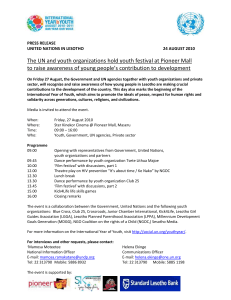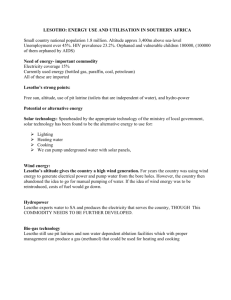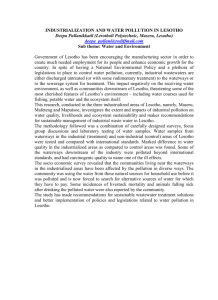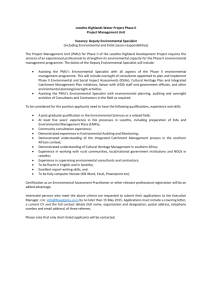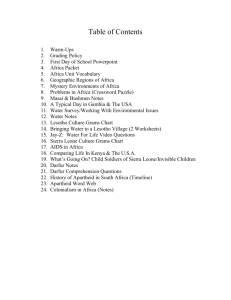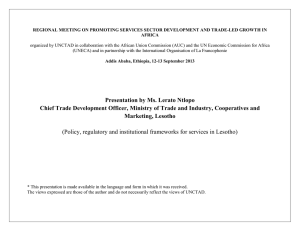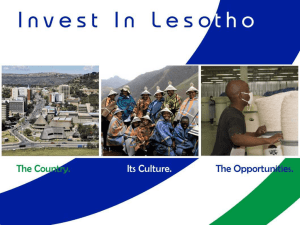REGIONAL MEETING ON PROMOTING SERVICES SECTOR DEVELOPMENT AND TRADE-LED GROWTH... AFRICA
advertisement
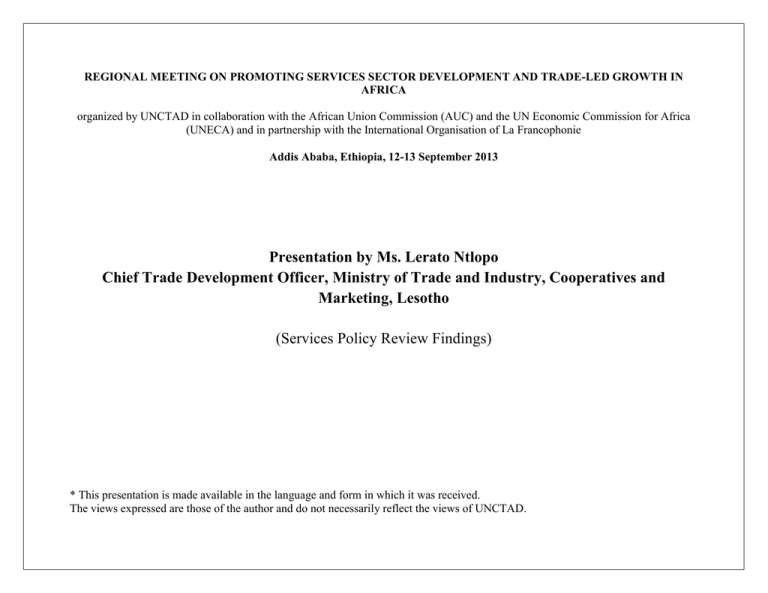
REGIONAL MEETING ON PROMOTING SERVICES SECTOR DEVELOPMENT AND TRADE-LED GROWTH IN AFRICA organized by UNCTAD in collaboration with the African Union Commission (AUC) and the UN Economic Commission for Africa (UNECA) and in partnership with the International Organisation of La Francophonie Addis Ababa, Ethiopia, 12-13 September 2013 Presentation by Ms. Lerato Ntlopo Chief Trade Development Officer, Ministry of Trade and Industry, Cooperatives and Marketing, Lesotho (Services Policy Review Findings) * This presentation is made available in the language and form in which it was received. The views expressed are those of the author and do not necessarily reflect the views of UNCTAD. Services Policy Review LESOTHO Session III Regional Meeting On Promoting Services Sector Development And Trade-led Growth In Africa Addis Ababa, Ethiopia - 12-13 September 2013 Presentation by Lerato Ntlopo Ministry of Trade and Industry, Cooperatives and Marketing Lesotho Presentation outline • Introduction • SPR Main findings • Main challenges, – General – Sector specific • SPR Key recommendations – General – Sector specific • Lessons learned – South Africa • Interface between policies • Conclusion Introduction u Services are becoming crucial for development, including the achievement of the Millennium Development Goals u Services economy is the new frontier for the expansion of trade, productivity and competitiveness u Services play an important facilitative role, as an input to production of goods and other services u BUT § Poor laws, inadequate policies, and inefficient institutions hamper the ability of countries to take full advantage of the benefits of services trade u THEREFORE § Creating an enabling environment for services and services trade remains vital SPR - Lesotho u Trade in services in Lesotho is been acknowledged as one of the main contributors and potential drivers for economic development u The Government of Lesotho - through the Ministry of Trade and Industry, Cooperatives and Marketing (MTICM) - with the assistance of UNCTAD conducted the Lesotho Services Policy Review (SPR) in 2011/2012 for TOURISM; FINANCIAL and PROFESSIONAL-MEDICAL services u The rationale behind the choice of these sectors was their potential to contribute significantly to the future growth and development of Lesotho’s economy. SPR – Lesotho cont.. u The review process included an analysis of: § Policy, legislative and institutional framework; § state of development in the sectors § achievements, weaknesses, and regulatory and institutional challenges inhibiting sectoral development § policy options, including regulatory, institutional and sector specific trade policy reform measures to strengthen domestic supply capacity competitiveness § ways to ensure the sustainability of the development gains occasioned by services sector reforms (contribution to MDGs) Main findings u Lesotho’s services sector is the biggest contributor to the national gross domestic product and one of the largest sources of employment (57.9% in 2010) u Services trade provides a stable platform for increased economic efficiency which increases Lesotho`s productive capacity and competitiveness. u Increased trade in services has immense potential in creating sustainable jobs and increased human development in Lesotho as services open up new opportunities various types of businesses to thrive including for MSMEs Main Challenges u SPR established some policy, regulatory, and institutional challenges: u No clear policy framework on services u Lack of clear services development/export strategy u Services trade not clearly mainstreamed into national development plan u Inadequate human and institutional capacities u Limited capacity to conduct policy analysis in lead agencies and key stakeholder groups Challenges – Financial Services u Few policies/legislation (not all subsectors covered) u Outdated legislation and delays in passing and implementing legislative reforms (e.g. Insurance Act 1976) u Insufficient institutional capacity to implement reforms in the financial sector u Weak supervisory and enforcement powers (CBL) u Access to finance: u Lack of clarity surrounding procedures required to access finance and credit facilities (MSMEs) u Share of Basotho accessing credit – 16.6% formal, 38.5% total u Absence of credit bureau Challenges – Tourism Services u Inadequate legislation u - pace with industry development u Exclusion of some subsectors – Tour Operators u Fragmentation of licensing authorities u No policy on community beneficiary programmes u Sustainability of tourism development threatened by lack of full implementation of Environment Act u Lack of clarity on division of responsibilities of MTEC and LTDC u Deficiencies in infrastructure services relevant to the support environment for tourism enterprises u No standards set or grading system for tourism products Challenges - Professional – Medical Services u Outdated laws u Institutions are understaffed, under-funded, centralised, few powers under their governing legislation u Few training colleges, low enrolment rates, low level of qualifications - no medical school * u Scarcity of skills in medical and allied professions, particularly in terms of shortage of pharmacists, medical doctors and dentists General Recommendations u Development of a national services development strategy plan u Investigation of ways to improve infrastructure services that support the services sector u Formulation of competition Law and establishment of competition Authority u Enactment of a comprehensive Investment Code u Collection and publication of up to date data on specific services sectors u The trade liberalisation strategy focus on securing access to other markets as Lesotho’s market is already open to foreign services Financial Services: u Development of appropriate financial policies u Consumer, microfinance policies u Improvement of formal and non-formal banking financial services mostly for rural areas u Improve access to both formal banking and nonbanking financial services in the rural areas u Increase competition and lending in Lesotho’s commercial banking sector u Simplified procedures for SMMEs to access finance and credit facilities (loan management and repayment mechanisms). Tourism Services u Dialogue between relevant institutions u Development of standards and grading system for services products u Full implementation of the Environment Act in Lesotho u Updating and strengthening of laws u Empower industry associations to play a more prominent role in the development of sector operators u Improve coordination between the institutions responsible for policy formulation and implementation – proposes a role-sharing mechanism for implementation of the Tourism Act Professional-Medical Services u Approval and implementation of professional skills retention strategy u Increase the number of medical professionals § Doctors - medical school, § Nurses - more training institutions, § Use of retired medical professionals – short-term contracts and mentorship programmes u Partnerships with other countries to attract health professionals Lessons from South Africa u South Africa has dedicated efforts to develop its services sectors u Regulatory and institutional frameworks supportive of services sector development: u Regulators for each sector/sub-sector § E.g. Financial services (i.e banking, and non banking regulators) u A division for services under DTI u Specific sector organisations as well as plans for building services coalitions. Managing the interface between Trade Policy, Sector Policy and more general Economic and Social policies • Clear policy framework on services to ensure contribution to economic development • Appropriate balance between sector development, sector regulation, services liberalisation • Clear services development/export strategy • Improving regulations and the regulatory capacity across sectors • Improving human and institutional capacities • Mainstreaming services trade into national and regional trade and development plans • Avoiding developing policies in silo Conclusions u For trade in services to effectively play its role in economic development and sustainable growth, there is a need to better channel both technical and financial resources and capacity building programmes to overcoming services supply capacity gaps by: § developing the services sector through increased investment; § improving policy and regulatory frameworks, and § enhancing institutional capacities of regulatory authorities u Lesotho is grateful to UNCTAD for the SPRs initiative § At initial stages of implementing the recommendations § Needs support in developing a strategic vision for the development of the services sector and services trade. Kea lehoba Khotso, Pula, Nala !!! LERNTLOPO@GMAIL.COM


